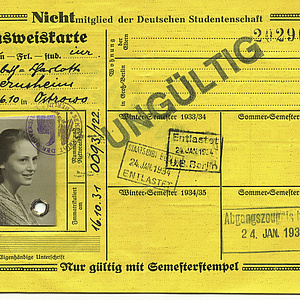People went to the other side of the street
Studying law in the Weimar Republic
Elisabeth-Charlotte Bollert was born in 1910 in the then Prussian town of Ostrowo. At the beginning of the First World War, her mother fled with her to relatives to escape the Russian army. Her father, who had been drafted as a reserve officer, returned in 1919. The family first moved to Kassel, where her father worked as a judge, and then to Berlin in 1922.
After graduating from high school in 1930, Elisabeth-Charlotte Bollert first studied Roman law in Paris, then law in Freiburg and Berlin. Even before 1933, she experienced parades of Nazi students and brawls at Berlin University.
Harassment at Berlin University
When Elisabeth-Charlotte Bollert was also issued with a yellow student card for "non-Aryans" in 1933, her acquaintances suddenly began to avoid her. This card stated that she was allowed to continue studying in the winter semester of 1933/34 because her father had been a front-line fighter in the First World War. However, she was not admitted to the first law examination - without explanation.
She was therefore unable to continue her studies, left university and transferred to a commercial college, where she learnt typing and shorthand. She worked as an assistant in a lawyer's office for a year. Berlin University de-registered her in January 1934 "for not attending lectures".
Her future husband was about to complete his doctorate in economics when his previous supervisor emigrated after the National Socialists came to power. The new supervisor, Prof Dietze, blackmailed the student in the final oral examination. He only accepted the examination on the condition that Mr Bollert renounced the grade "very good".
Persecution of the Jewish father
Elisabeth-Charlotte Bollert's Jewish father, who worked as a judge at the district court, initially kept his job due to the exemption for front-line fighters. At the beginning of October 1935, he was then forcibly expelled from the court by the SA and forced to retire. Under National Socialism, his parents' marriage was categorised as a "privileged mixed marriage", which is why his father was not initially deported. However, he had to perform forced labour in Berlin and in February 1943 he was threatened with deportation in the so-called "Fabrikaktion". He was imprisoned with other Jewish men in Rosenstraße, but was released again after protests from his non-Jewish wives.
Life under National Socialism
In January 1934, Elisabeth-Charlotte Bollert married her long-term boyfriend and moved to Hamburg. She had four children and gave up her job. Due to his Jewish background, her husband was unable to find a job that matched his academic qualifications and had to stay with relatives as an apprentice. In 1938, the family moved back to Berlin, where Mr Bollert opened a shoe company, which was outwardly represented by a non-Jewish partner. In Teltow, on the outskirts of Berlin, the Bollert couple bought a house with a large garden so that the children could grow up away from the big city.
In the final months of the war, Mr Bollert, who was considered "unworthy of military service" as a "half-breed" and was not drafted, had to do forced labour in Saxony-Anhalt. Elisabeth-Charlotte Bollert had fled with her children to the vicinity of Dresden at the beginning of the bombing campaign, where she lived until the end of the war.
After the liberation
When Mr Bollert returned to Teltow by bicycle after the war to check on the house, the lodger wore his suit: "I didn't think you would come back again". In the summer of 1945, Mr Bollert took over the management of the Teltow district economic office, as he was no longer able to run his own business after it had been looted. The rest of the family finally returned in July.
Escape to West Berlin
Mr Bollert got into trouble because of his political stance and was eventually dismissed. He then worked as a personal assistant to FDP politician Elisabeth Lüders in West Berlin, but continued to live in the family home, which was now in the Soviet-occupied zone. When State Security agents began looking for him in January 1951, he stayed in West Berlin and brought the family home. He was instrumental in setting up the Berlin Compensation Office and moved to the State Statistical Office in 1955.
Until her death in 2004, Elisabeth-Charlotte Bollert and her husband took an active part in Berlin's cultural life, were members of cultural associations and went on cultural trips.


